Stephen Colbert had a problem. The star of "The Colbert Report" had just clicked on an urgent e-mail from Newsweek magazine, discovering they had changed the cover he had posed for - something they promised they wouldn't do.
He was at the end of a marathon day, arriving in Iraq, shooting bits for his show, and meeting with hundreds of troops. Now it was midnight and Newsweek had sent him six urgent e-mails. The magazine was due to the publisher shortly.
The cover showed Colbert with the word "Iraq" shaved into the side of his head. At the bottom of the page had been a headline, asking if Americans had forgotten about the war-but now it was gone. Colbert had been the guest editor for the issue and decided the headline, but the people at Newsweek wanted the image to speak for itself. Colbert sank his head into his hands. Would anyone get the message'
"They promised they wouldn't do it," Colbert related from his New York office where he tapes his show. "I told them, 'Once I leave the country, you can't change anything.' That was my deal."
Not knowing what to do, he closed the image and walked into an adjacent mess hall where he found some Soldiers drinking coffee. "Soldiers," Colbert called to them, "I need your help." The men followed him to his computer station.
He explained his job with Newsweek, and said he needed their help to decide the cover. He clicked on the image and the men cheered and high-fived each other. "Alright," Colbert said. "Alright, that's nice, but what does it mean'"
The men fell silent and studied the image. Finally, one spoke up: "It means Iraq is on your mind, and it should be on our minds too."
A relieved Colbert blurted out "Done! Thank you." Then he gave credit where it was due. He turned to the Soldier and told him, "You can tell your folks that you decided the cover of Newsweek." Colbert, who had come to Iraq for the troops, was finding out that the troops were there for him.
For those who don't know Stephen Colbert, he plays a faux-conservative pundit on a popular half-hour satirical news show weeknights on Comedy Central. But his character is more than a pundit. He's a blustery egotist with an insatiable appetite for attention. You might say he lives in a "Colbert-centric" universe. He also has no object permanency. As Colbert put it: If a ball rolls behind a couch he's like a 2-year-old-he doesn't think the ball exists anymore.
But Colbert-the-character and Colbert-the-man have something in common: They both love the troops. And Colbert proved it when he taped his "Colbert Report" from one of Saddam Hussein's palaces in Iraq's Green Zone for an entire week in June 2009.
THE REQUEST
Colbert's Iraq adventure began in 2008, when retired Marine Col. Bing West asked him, "If Gen. (David) Petraeus invited you to come do your show in Iraq, would you do it'"
West was promoting his book, "The Strongest Tribe," on Colbert's show when he leaned over during the commercial break and made the proposal. "I would be honored," Colbert responded. "But that's not the same thing as a 'yes.'" Colbert had a 91-person staff and knew he could not commit without asking them. "But I immediately wanted to go."
Colbert already had a good relationship with the military. Soldiers and Marines who loved his show sent him American flags that had either flown over a base or had gone along on a mission. The first was a flag that went along on a Black Hawk helicopter during Operation Beef Hammer in Afghanistan in 2006. Colbert created a "shout out" on his show to honor any servicemembers who sent him a flag.
"I was loving that we were making these guys laugh in these terrible conditions," he explained.
Beyond his show, Colbert had visited recovering troops at the National Naval Medical Center in Bethesda, Md., and raised money for the Yellow Ribbon Fund, which helps injured veterans, and Donor's Choose, where he helped raise funds for schools on military bases.
But a trip to Iraq was different. Colbert didn't know exactly how to ply his trade outside the studio. As a political satirist, his brand of humor might not be appropriate for a military audience.
"You don't want to satirize the troops," explained Colbert. But if he had gone to Iraq without putting on his usual act, people would be disappointed. "That would be patronizing." He just needed to figure out how to solve that puzzle.
The answer came six months later at a Donor's Choose board meeting. Colbert asked one of the board members, who had been to Iraq, how the troops were doing. The man told him that their morale was good, but they were disappointed that no one was talking about them. The answer gave Colbert pause.
"We're so busy navel-gazing and (worrying) about our 401(k)s," he related. "And they're putting their lives on the line and we've forgotten that we sent them over there."
With that in mind, Colbert asked one of his researchers to prepare a chart tracing media stories about Iraq versus stories about the economy.
"The chart looked like a butterfly," Colbert explained, with stories crossing each other in September 2008, before the economy became the dominant topic. Colbert had his answer.
"Now we have a reason to go," he realized, "because my character thinks it's over." He could tell the troops that people should remember they were still there, even if Iraq had fallen out of the headlines.
"I have this satirical conceit in which to say that, and I can be positive and patriotic about it." Colbert would go to Iraq to declare victory.
Colbert had another weapon in his humor arsenal: He could make fun of himself.
Before he flew to Iraq, he reported to Fort Jackson, S.C., with camera crew in tow, for 10 hours of training. Sgt. 1st Class Demetrius Chantz made the comedian run, do pushups and sit-ups, cross monkey bars, navigate an obstacle course, and rappel from the top of a tower. Colbert proved to be one of the worst trainees in the history of the Army, cracking jokes, complaining and singing throughout his workout. But the training was real.
"I was exhausted the whole time," admitted Colbert, who was 45 years old at the time. Terrified of heights, he was a bit shaky about climbing the tower before rappelling, but he knew it would make for great laughs. "If I didn't know it was going to be a great moment, I could have never have done it."
Chantz was the perfect foil for Colbert's character.
"He was loud, direct and stone-faced," explained Colbert. There was no script-everything was improvised. "I made him laugh once," Colbert said, swelling with pride. "I shushed him."
INTO IRAQ
Now fully trained, Colbert and part of his crew headed to Iraq. He was a little nervous about heading into a war zone, but as he departed his commercial flight in Kuwait and boarded a C17 Globemaster headed for Baghdad Airport, he noticed the South Carolina flag painted on the aircraft's tail.
As a child growing up in Charleston, he had seen military aircraft making touch-and-go landings at a nearby base and circling in the skies above. They had the state's distinctive flag painted on their tails. Colbert suddenly felt safe.
"These planes are from Charleston," he told his staff. "Everything's going to be fine."
After landing, Colbert worked non-stop. He called the week-long special "Operation Iraqi Stephen: Going Commando" and taped it from Camp Victory. He wore a special camouflage suit, complete with khaki shirt and tie and desert boots.
Gen. Raymond T. Odierno, who had replaced Petraeus as the commander of Multi-National Force-Iraq, showed up to shave Colbert's head onstage at the behest of President Barack Obama, who appeared via a huge screen. When Colbert wasn't writing or taping the shows, he visited the troops.
Colbert shook so many servicemembers' hands that he developed tendinitis.
"These were people in the prime of their health, and they were happy to see me and I was happy to see them," he explained. He shook an average of 800 hands in two hours. By the end of the week, he could barely squeeze a fork.
Colbert's hectic pace almost got him in trouble. While changing venues around Camp Victory he kept losing his security guards.
"I was running everywhere I went and I'd turn around and go 'Oh no!' because my guard wouldn't be with me." He shook two bodyguards in two days. The Army had to take drastic measures.
First Lt. Lisa "Mouse" Turner, a morale, welfare and recreation officer, addressed the problem. "Sir," she called to Colbert in a no-nonsense voice, "I need to speak with you." He knew he had done wrong. "I'm kind of in trouble, aren't I'" he asked.
"Yes sir, you kind of are," she said.
Then she introduced him to Navy Senior Chief Petty Officer Tony Rizi and got right to the point.
"You are not to go anywhere without him, sir. If you do not take him with you, he is in trouble-with me. Do you want to get him in trouble'" Colbert was immediately contrite. "No, I don't."
"Alright," said Turner, "do we understand each other'" Colbert knew the right answer: "Yup, absolutely."
Rizi, who was also from South Carolina, escorted Colbert for his last five days in Iraq, never letting him out of his sight, except for bathroom breaks. He would stand right outside the door." Rizi became more than just a security guard. Colbert also recruited him as a staff writer, constantly asking him, "Tony, what do you think of this joke'"
In fact, Colbert solicited input from just about any servicemember within arm's reach. He would stop them, show them a joke relying on military jargon, and ask, "Does this mean anything'" And when they told him it did, he would follow up with, "Well, what does it mean'"
By the end of the week, Colbert and his team had delivered four episodes of his show to a cheering audience in battle dress uniforms. The show was a hit back in the U.S., averaging 1.8 million total viewers, the show's highest ratings ever. People were reminded that the troops were still in Iraq, and doing well.
But the troops gave something back to Colbert, who had never served in the military and grew up in the early 1970s, when the military was unpopular. Without realizing it, he had considered servicemembers different from himself. But after that week in Iraq, with constant exposure to men and women in uniform, something changed.
"I had such an affectionate week there," he explained. The appreciation he felt for the troops was equaled only by the appreciation they felt for him.
"That gratitude was so physical, I could almost see it hanging in the air between me and the people who I was doing my show for." His appreciation dispelled something he did not know he had: the feeling that military people were different. "They are not," said Colbert, seriously. "I could see myself in that life, and I could see them in my life."
Colbert hoped that feeling would translate to his show's young, urban audience, who would see that 18- and 19-year-old men and women serving overseas were no different from them. If that message alone penetrated the American psyche, then the trip was worth it.
"That was one of the greatest gifts of that trip to me," said Colbert. "It made me patriotic and made me proud to be an American in ways I had not experienced before, and did not know that I had not experienced."
VICTORY CELEBRATION
Colbert followed up his salute to the troops in Iraq a year later by welcoming home Iraq veterans with a victory celebration in his studio. For two days, Sept. 8 and 9, 2010, he taped special shows entitled "Been There, Won That: The Returnification of the Ameri-Can-Do Troopscapeon."
It included live satellite feeds to the non-combat troops at Joint Base Balad, Iraq, and the troops at Forward Operating Base Lagman in Afghanistan. Odierno returned and Colbert repaid his head shaving by presenting the general with a wig. Vice President Joe Biden showed up to serve hot dogs to the troops.
Petraeus joined the celebration in a previously taped recording, saluting Colbert and his "Colbert Nation" (viewers who donate to the star's charities) with an Army commendation and lapel pin. Originally, Colbert did not want the award.
"I want this show to be about the troops, not about me," he said at the time. "Although, my character would love it."
The Army compromised and changed the commendation to read "Colbert Nation" instead. Petraeus appreciated the chance to show Colbert what the Army thought of him.
"It was a pleasure to do it," he explained after the presentation. "It was an honor to help recognize Stephen and the team."
Today, Colbert and his character continue to honor the troops. Outside his studio, his security team asks if there are any servicemembers in the audience line and gives them priority seating. Inside his office, military mementos adorn his walls, including an 82nd Airborne Division flag he received from an injured Soldier one night, when he addressed the treatment of veterans on his show. The Soldier's wife had to speak for him, and said, "Please don't stop talking about it (the plight of veterans)."
He won't. While Colbert knows that his character and show have become an iconic part of American culture, he wants to focus the limelight on those he finds more deserving: Americans in uniform, serving in harm's way far from home.

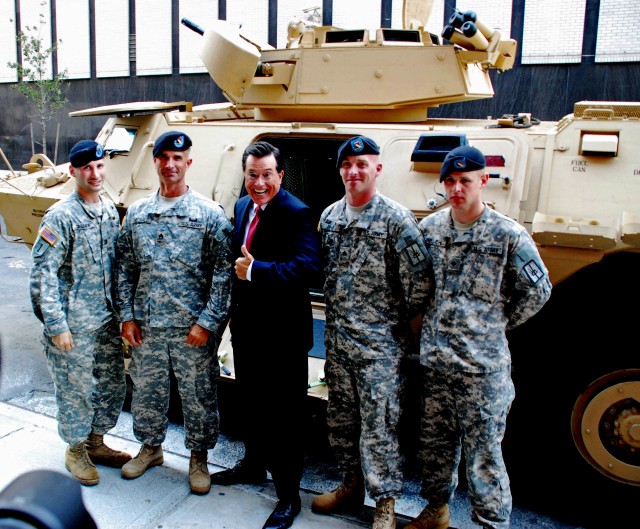
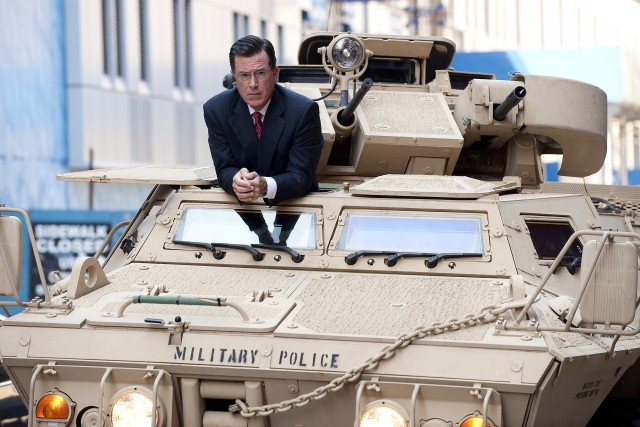
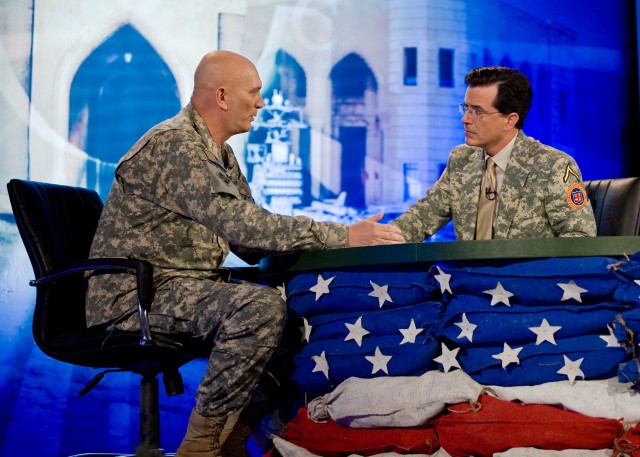
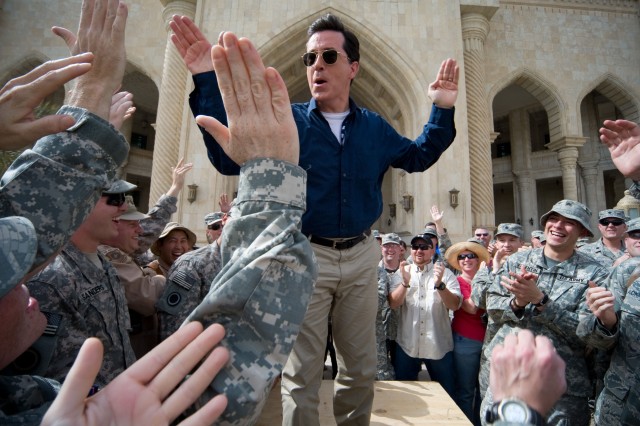
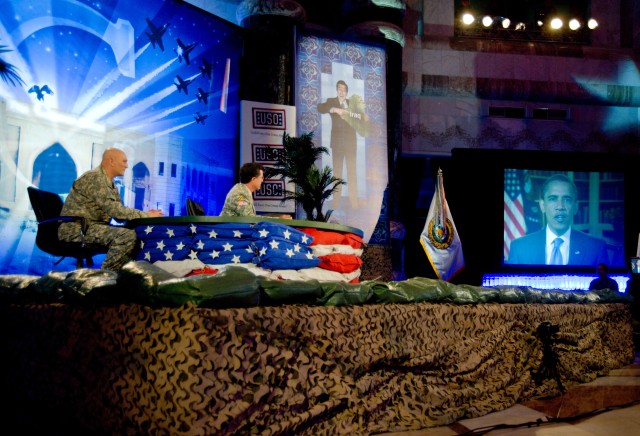
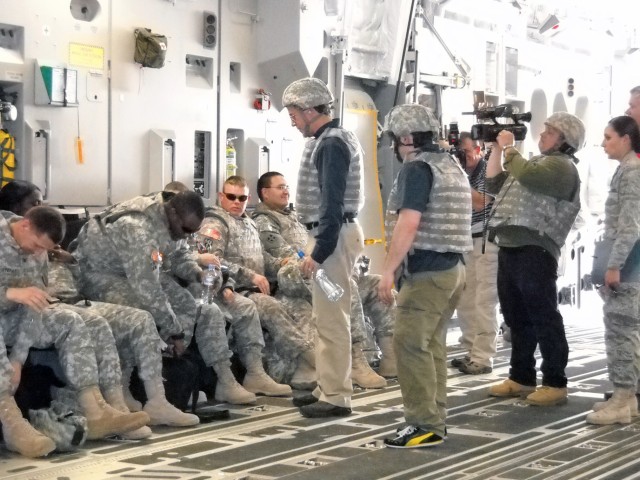
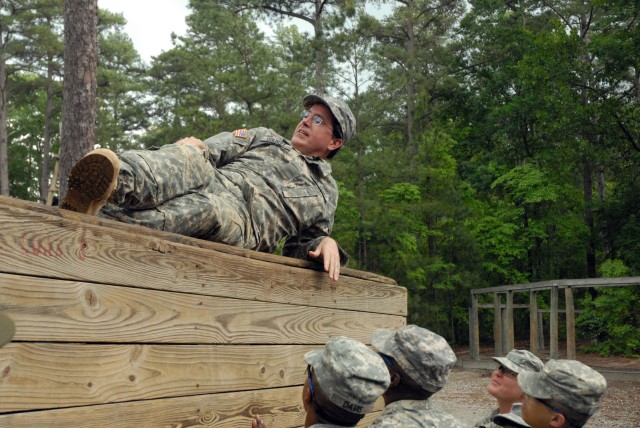


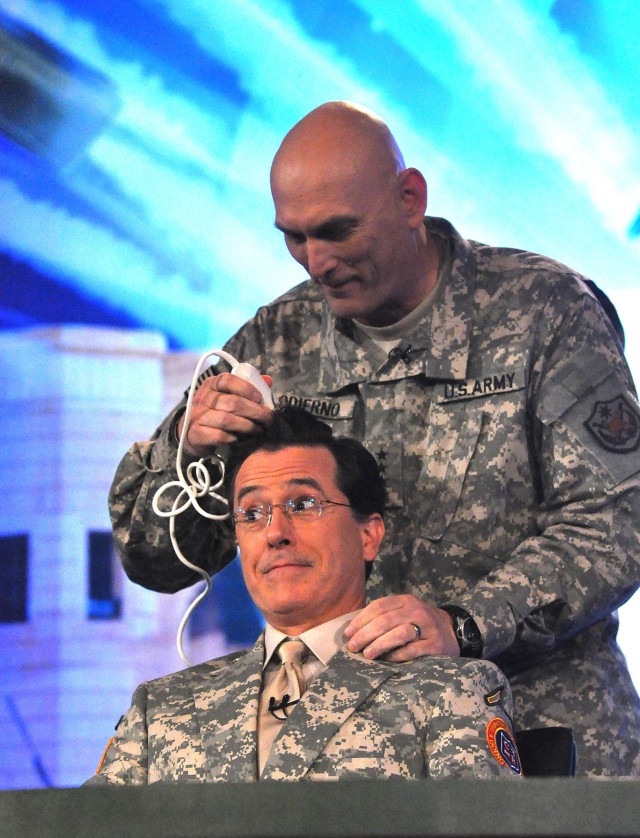










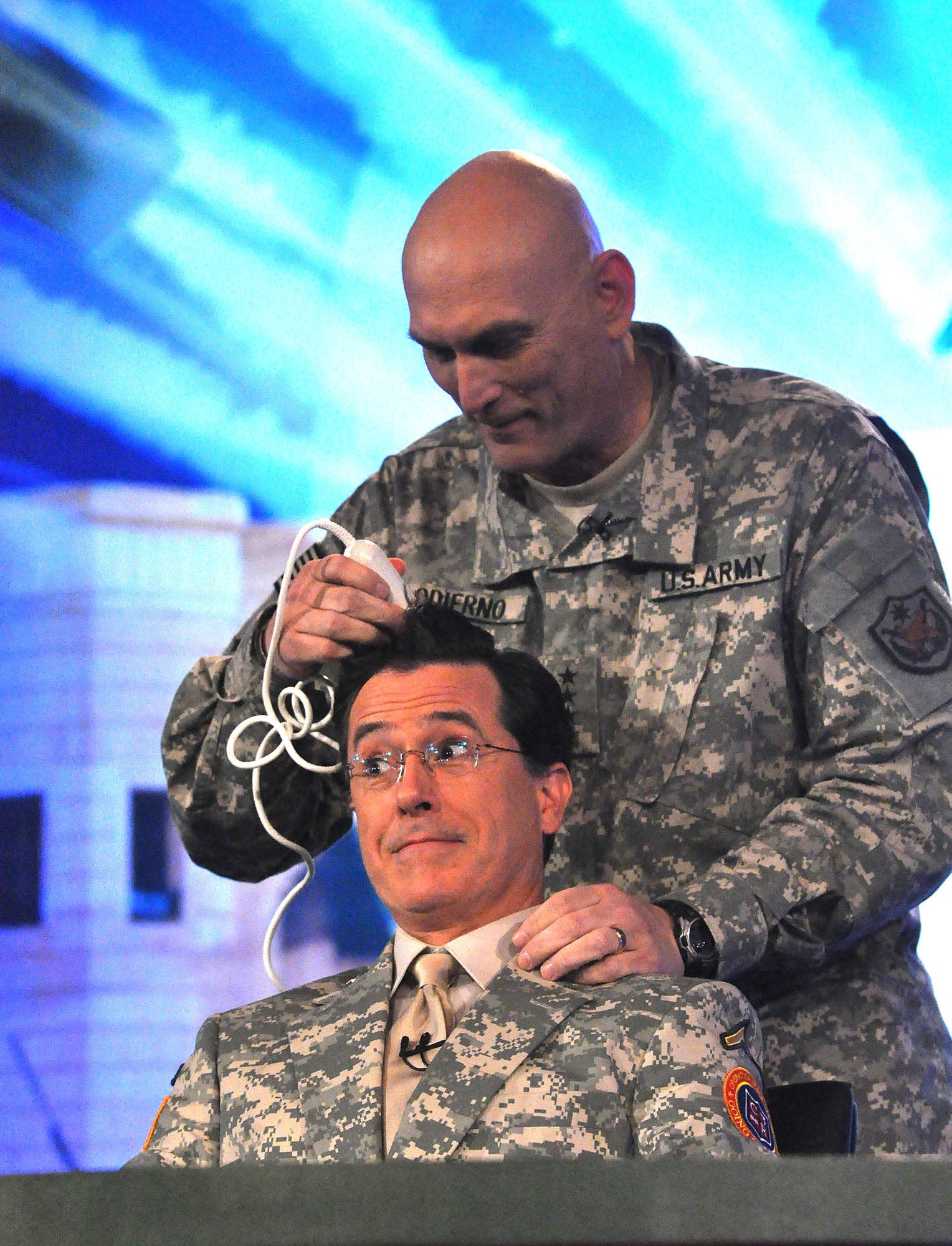
Social Sharing